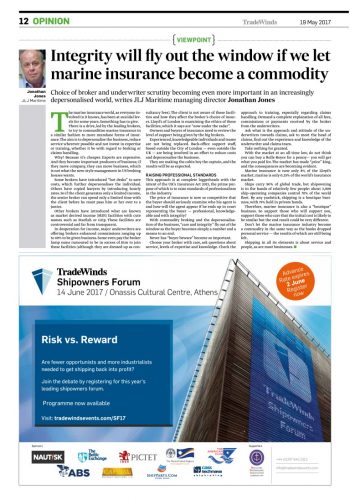Tradewinds 19.05.17 Choose your broker wisely
 Integrity will fly out the window if we let marine insurance become a commodity
Integrity will fly out the window if we let marine insurance become a commodity
Choice of broker and underwriter scrutiny becoming even more important in an increasingly depersonalised world, writes JLJ Maritime managing director Jonathan Jones
May 17th, 2017 17:59 GMT by Jonathan Jones
The marine insurance world, as everyone involved in it knows, has been at suicidal levels for some years. Something has to give. There is a drive, led by the leading brokers, to try to commoditise marine insurance in a similar fashion to more mundane forms of insurance. The aim is to depersonalise the business, reduce service wherever possible and not invest in expertise or training, whether it be with regard to broking or claims handling.
Why? Because it’s cheaper. Experts are expensive. And they become important producers of business; if they move company, they can move business, which is not what the new-style management in US broking houses wants.
Some brokers have introduced “hot desks” to save costs, which further depersonalises the individual. Others have copied lawyers by introducing hourly rates. So if the client generates only a limited income, the senior broker can spend only a limited time with the client before he must pass him or her over to a junior.
Other brokers have introduced what are known as market derived income (MDI) facilities with cute names such as Starfish or Grip. These facilities are controversial and far from transparent.
In desperation for income, major underwriters are offering brokers enhanced commissions ranging up to 40% to be given business. Some even pay the broker lump sums rumoured to be in excess of $1m to join these facilities (although they are dressed up as consultancy fees). The client is not aware of these facilities and how they affect the broker’s choice of insurer. Lloyd’s of London is examining the ethics of these facilities, which it says are “now under the radar”.
Owners and buyers of insurance need to review the level of support being given by the big brokers.
Experienced, knowledgeable individuals and teams are not being replaced. Back-office support staff, based outside the City of London — even outside the UK — are being involved in an effort to reduce costs and depersonalise the business.
They are making the cabin boy the captain, and the results will be as expected.
This approach is at complete loggerheads with the intent of the UK’s Insurance Act 2015, the prime purpose of which is to raise standards of professionalism in the industry.
The price of insurance is now so competitive that the buyer should seriously examine who his agent is and how will the agent appear if he ends up in court representing the buyer — professional, knowledge able and with integrity?
With commodity broking and the depersonalisation of the business, “care and integrity” fly out of the window as the buyer becomes simply a number and a means to an end.
Never has “buyer beware” become so important.
Choose your broker with care, ask questions about service, levels of expertise and knowledge. Check the approach to training, especially regarding claims handling. Demand a complete explanation of all fees, commissions or payments received by the broker from the underwriters.
Ask what is the approach and attitude of the underwriters towards claims, ask to meet the head of claims, find out the experience and knowledge of the underwriter and claims team. Take nothing for granted.
With the market at an all-time low, do not think you can buy a Rolls-Royce for a penny— you will get what you paid for. The market has made “price” king, and the consequences are becoming evident.
Marine insurance is now only 8% of the Lloyd’s market; marine is only 0.25% of the world’s insurance market.
Ships carry 90% of global trade, but shipowning is in the hands of relatively few people: about 3,000 ship-operating companies control 70% of the world fleet. By any yardstick, shipping is a
boutique business, with 75% held in private hands. Therefore, marine insurance is also a “boutique” business. So support those who will support you, support those who care that the initial cost is likely to be similar but the end result could be very different.Don’t let the marine insurance industry become a commodity in the same way as the banks dropped personal service — the results of which are still being felt.
Shipping in all its elements is about service and people, as are most businesses.

